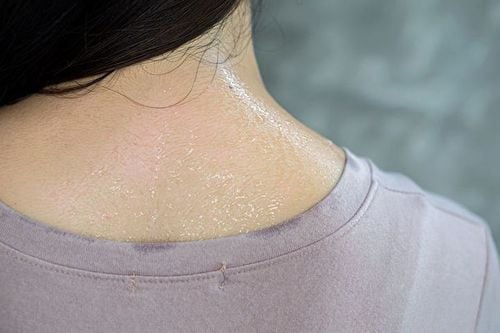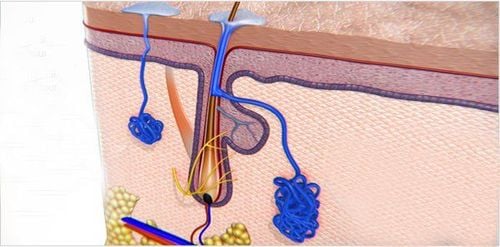This is an automatically translated article.
Sweating is completely normal, especially during exercise or hot weather. However, many people are surprised and wonder when their sweat has a slightly salty taste. Science calls this type of sweat salt sweat. So what is salt sweat and is salt sweat good?
1. What is salt sweat? What is oily sweat?
Sweat is a form of secretion, which has a cooling effect on the body when we exercise vigorously or when the weather around is too hot. In addition, the phenomenon of sweating is also present when we are in a state of anxiety or have a high fever because of a certain medical condition. The amount of sweat excreted each day depends on each specific situation. When the weather is hot or in people who often work hard, the body excretes more sweat. On the contrary, the case of resting in a cool environment, the amount of sweat will of course be less. According to statistics, people who are not used to the hot climate in the deserts of Africa can produce about 1 liter of sweat in just 60 minutes.
So far, sweat is divided into 2 types: salt sweat and oil sweat:
Salt sweat has a salty taste because the composition includes water, a small amount of salt (crystallized from the electrolytes Sodium, Potassium). , Chlorine) and some electrolytes; Oily sweat is a type of sweat that carries oil, has no salty taste, and makes our skin always feel greasy. Salinity of salt sweat more or less varies, depending on the body of each person and a number of other factors such as:
The diet provides too much sodium, including from both table salt and sodium in foods. canned foods; People who exercise at high intensity regularly or are professional athletes; The salinity of salt sweat can be a sign of certain medical conditions, such as cystic fibrosis. In fact, there are many cases of salt sweat with such high salinity that when it dries, a white precipitate of salt crystals will appear on clothes or on the skin.

Mồ hôi muối thường có vị mặn phụ thuộc vào cơ địa của mỗi người
2. Is salt sweat good?
Similar to the characteristics mentioned above, salt sweat is still a normal body sweat. However, if salt sweat occurs in children, parents need to pay special attention because this can be a sign of cystic fibrosis.
Specifically, patients with cystic fibrosis have 2 faulty or mutated genes. In it, there is a mutation that makes it difficult to transport chloride (electrolytes that will crystallize into salts) through the cell membrane. This leads to a higher than normal amount of salt excreted in sweat along with an increase in the viscosity of mucus in the lungs and digestive system.
Children are susceptible to cystic fibrosis, which is genetic inheritance from parents. According to statistics, each pair of parents carrying this disease will have:
25% chance of passing the cystic fibrosis gene mutation to their children; 50% chance of giving birth to a child carrying a mutated gene that causes disease but does not manifest the disease outside; 25% chance the baby is born completely normal, not carrying the disease gene. Cystic fibrosis is relatively common in infancy, and most cases go undiagnosed until adulthood. Therefore, if parents notice that their child is sweating salt or their sweat has an unusual salty taste, they should quickly take the baby to the doctor for a comprehensive health check.
3. Measures to limit salt sweat is what?
Salt sweat can be a sign of cystic fibrosis, so when detected, it is necessary to go to the hospital for an accurate examination and diagnosis, thereby giving treatment and limiting the condition of salt sweat. out too much. If it has been determined that the condition is not due to a medical condition, people who experience saltier-than-normal sweat can take the following measures to correct it:
Do exercise at home or outdoors Avoid exercising in very hot environments. The average amount of sodium in a liter of sweat is only about 500mg, but if you are not used to exercising in a hot, high temperature environment, the body can excrete up to 1.1g of sodium in a liter of sweat; A diet that reduces the supply of salt (sodium) is also a way to limit salt sweat. The average adult should not consume more than 2.3g of sodium per day, with diabetes, hypertension or over 51 years old should not consume more than 1.5g sodium per day. In addition to diet and exercise, we can also apply the following measures to limit the effects of salt sweat on daily life:
Wear an inner bra to absorb sweat odors before they penetrate the outer layer of clothing; Choose colored clothes, especially when exercising or needing to be active; Prioritize using clothes specifically for training with the advantage of quickly drying sweat. After each practice, it is necessary to take advantage of washing with cold water many times; Use antiperspirant solutions in several locations to prevent excessive sweating. However, antiperspirants can leave "stubborn" stains on clothes.

Nguồi ra mồ hôi muối nên lựa chọn quần áo trang phục phù hợp
4. Diet affects the amount of sweat
The diet includes foods that make the muscles of the whole body work hard (like eating spicy foods), the capillaries dilate, the skin temperature rises and then the temperature receptors send a signal nervous system for the central nervous system to turn on the mode of cooling the body by excreting more sweat.
Besides, when we use strong alcohol, the amount of sweat excreted is also more than usual. This is because the alcohol in alcohol stimulates the heart to contract and causes dilation of small blood vessels. The same thing happens when we drink coffee, because the caffeine in this drink can stimulate the central nervous system and activate sweat glands to work more intensely.
In addition, diet affects in addition to quantity can also affect the smell of sweat. We can easily feel the unpleasant smell of sweat in people who are new to foods prepared with too much garlic or onion. Research conducted by Czech scientists shows that we can even smell sweat and tell the difference between vegetarians and those who eat meat and fish.
So why do some people have strong sweat while most people don't? The basic composition of sweat consists of water with a mixture of electrolytes, a little fat and is essentially odorless. Some cases of smelly sweat have been shown to be caused by the metabolic byproducts of sweat-living bacteria.
Several experts have studied what types of fibers live most comfortably. As a result, polyester-based fabrics are at the top of the list and they are a favorite habitat for the Micrococcus strain. This explains the phenomenon of sweat has a characteristic odor on the training clothes of sports athletes. In addition, studies show that odor-causing bacteria often do not like to reside on natural cotton fabrics.
Follow Vinmec International General Hospital website to get more health, nutrition and beauty information to protect the health of yourself and your loved ones in your family.
Please dial HOTLINE for more information or register for an appointment HERE. Download MyVinmec app to make appointments faster and to manage your bookings easily.













